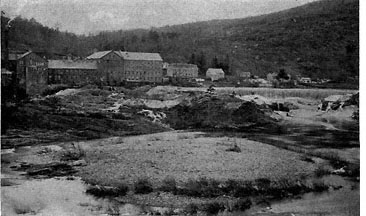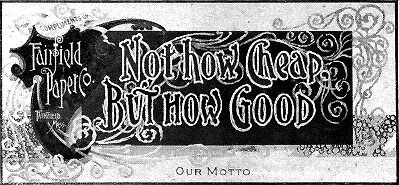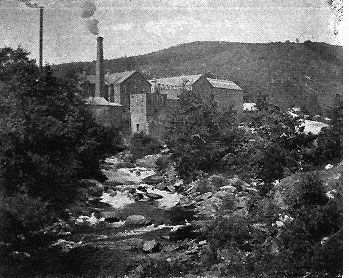The Fairfield Paper Company.
Traveling westward from the flourishing town of Westfield, following the highway which leads on to the village of Fairfield, one encounters a succession of pleasing surroundings. These run from the well-kept streets of the town to then rugged wildness of the valley, upon which the mountains known as Tekoa and Nero look down with their less noted brethren. The traveler is not looking for the achievements of human kind, if unacquainted with the valley, till he winds about the foot of a hill and beholds before him the typical New England village and the factory which gives life to it.

View of the Mill and Salmon Falls.
|
Prosaic business and the genius of manufacture never found a field more richly dressed by nature, and the wonder is that Col. R.M. Fairfield and his happy assistants at the paper mill in this picturesque region are not distracted by the natural beauty of their surroundings. The scenic beauties of this part of the county will be found described in the main part of this work, while the engravings on and fronting this book give further evidence of it.
It has remained for Roswell M. Fairfield, formerly of Holyoke, to bring this place to its full development as a paper manufacturing point, and his adherence to the motto on this page explains much of his success. Fortunately he has been aided by nature in his design of furnishing the very best goods in the market, for here crystal water, of superfine purity, has been placed at his command. Taking this place — in 1887, Mr. Fairfield began improvements which eventuated in the present complete equipment and better means of traffic and communication with the outside world. A handsome stone depot was erected on the Boston & Albany railroad and a bridge was thrown across the river.
The purchase included not only the mill buildings, with the massive stone dam and water power at that point, but as well 1,000 acres of land in the vicinity, the right to draw additional water from Hazard pond, located among the mountains at a height of 667 feet, with an unused water privilege below the mill, which might be utilized to run another establishment of equal capacity.
Although there are in the mill two Hyatt filters and one of the National pattern, their task is very light, as may be imagined from the remarkable purity of the water used. This water comes from springs upon the mountain side and flows into the mill without pumping, having a natural pressure of ninety pounds to the square inch. It is of remarkable purity, fully equal in this respect to the very finest paper-making waters of the Berkshire mountains of which Fairfield is a part, insuring for the finished paper a beautifully clear and perfect tone.
The new company is satisfying the claims of nature by making also wedding papers of spotless purity, providing linens of the finest texture, tempting the taste of the fastidious with Woronoco linen and ledger papers, "Fairfield" superfines, and making glad the hearts of the stationers throughout the land with its lines of pastel bristol boards for wedding cards, flat papers and ruled goods. One of the specialties is a very fine line of typewriter linens, which holds a high place in the market.

|
At the mills of this company whatever will conduce to the manufacture of the highest grades of paper is carefully and scrupulously adhered to, and nice regard is paid to educating the employed to a high order of production, not only for providing for them every convenience and comfort, but also by inciting them to cultivate habits of cleanliness and neatness in the execution of their duties. There are those employed about the mills whose sole work is to maintain constant cleanliness, an object lesson to the many workers. One hardly knows which to admire most, the thorough cleanliness and brightness maintained everywhere, or the convenient arrangement of the different rooms for forwarding the work of manufacturing. "Foreward to Excellence" is the motto from the time that the teamster unloads his rags and is echoed back all along the line.
One department in this section of the works is deserving of special mention, as it is peculiar to this company — the manufacture, upon their own premises, of the fine pasted bristol board for which the Fairfield company have so gratifying a reputation.
The finishing department is admirably lighted, and completely adapted in all respects to its purposes, Its outfit of machinery is ample, including eleven calenders, three presses, four large trimmers, a large breaker and two fine plates of the latest pattern, for use on wedding gods and the like. There is everywhere the most thorough precaution against fire. The spring water which is used in the engine room comes to the mill with such a head that it will deliver a stream over the highest of the buildings with a gratifying force, and with this, hose ready for immediate use is connected in every room. There are also sprinklers, fire pails, and the like, while fireproof doors shut each building from its neighbors, so that the spread of the flames ought to be confined to any section in which they might originate.

Picturesqueness of the Stream.
|
The establishment employs some 250 hands, and for their comfort every arrangement has been made which thoughtful care could employ. The mills are lighted throughout by electricity, a 250-light Mather dynamo supplying current; in addition to this a second dynamo is used to supply the magnetic current for the large patent iron extractors or separaters (patented and controlled by Mr. Fairfield) which are attached to each machine and by the use of which all the fine particles of iron are separated from the rag fibre, thus overcoming one of the paper manufacturer’s most serious difficulties, namely, the prevention of rust spots in the paper.
On the first floor of the main building are the general executive and typewriting department, immediately connected with which is the private office of the president and treasurer, the suite being fitted throughout with an eye to convenience and a perfect system in the transaction of business. The remainder of this floor is occupied by the sorting, cutting, packing and shipping departments, the calenders being on the same floor in the new addition. The second and third floors throughout both portions of the building re devoted to the drying lofts—in all establishments of this kind an important portion of the plant.
The spring water which is used in the engines is brought to the mill through an eight-inch pipe and six-inch pipe, and the supply would be adequate for several times the present demand. For turning the wheels of the mill the whole power of the Westfield river is available, but if that should prove inadequate, there is a double Corless steam engine of 300-horse power waiting to lend its strength.
Mr. Fairfield is president and treasurer of the company, Oscar S. Greenleaf of Springfield is secretary; and these two gentlemen, with Thomas A. Mole of Adams, form the board of directors. It would probably be difficult to find three men better fitted by natural bent and mature experience for the successful conduct of a paper mill of the highest class.
© Laurel O’Donnell 1996 - 2006, all rights reserved
This document may be downloaded for personal non-commercial use only
and may not be reproduced or distributed without permission in any format.
This is an edited adaptation from the original publication.
|